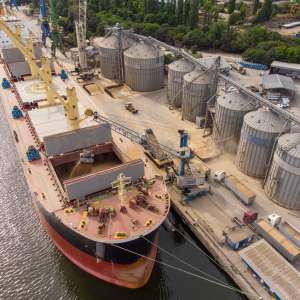Future of Ecommerce Logistics: Innovations and Challenges
Latest update on 4 Nov, 2024 by Vanessa Tam – Marketing Analyst at FreightAmigo
In the digital economy era, e-commerce has become an essential part of the global retail industry. With the widespread adoption of online shopping, e-commerce logistics is facing unprecedented challenges and opportunities. According to statistics, global online sales are expected to reach $6.91 trillion by 2024. This astounding growth trend has placed higher demands on logistics systems, compelling companies to address this transformation. By exploring the challenges and future development of e-commerce logistics, this article provides valuable insights and recommendations to help enterprises succeed in the rapidly evolving digital economy.
Want to Instantly Compare International Express, Air, Sea, Rail Freight And Truck Logistics Management Solutions To Control Transportation Costs?
Challenges Faced by Ecommerce Logistics
Although e-commerce logistics is developing rapidly, it still faces various challenges:
Cost Pressure
- As consumer expectations for free and fast delivery continue to rise, the pressure on logistics costs is continuously increasing. Enterprises need to find a balance between meeting customer demands and controlling costs.
Inventory Management Difficulties
- Accurately predicting demand and optimizing inventory levels is a daunting task, especially in the face of seasonal fluctuations and unexpected events. Both overstocking and stock shortages can lead to losses for the enterprise.
Delivery Efficiency
- In urban areas, traffic congestion and parking difficulties increase the complexity of deliveries.
Reverse Logistics
- Up to 30% of online orders may be returned, placing significant pressure on the logistics system. Effectively managing the returns process is crucial for cost control and customer relationship maintenance.
Technology Integration
- Although new technologies are bringing opportunities to logistics, how to effectively integrate and apply these technologies is also a challenge. Enterprises need to invest in funds and time to upgrade systems and train employees.
Environmental Sustainability
- As people’s concern for environmental issues continues to grow, how to reduce the environmental impact of logistics activities has become an important issue facing enterprises.
Innovative Trends in E-Commerce Logistics
Facing increasingly complex challenges, e-commerce logistics is undergoing a profound transformation, and the following innovative trends are worth noting:
Artificial Intelligence and Machine Learning
AI and machine learning are fundamentally changing the logistics decision-making process. Applications include:
- Demand Forecasting: Using historical data and external factors to more accurately predict demand
- Route Optimization: Real-time analysis of traffic data to optimize delivery routes
- Warehouse Automation: Smart robots assist in picking and packing
- Customer Service: AI chatbots handle inquiries and issues
These technologies help improve operational efficiency, reduce costs, and provide personalized services.
Internet of Things (IoT)
IoT devices are bringing unprecedented visibility to logistics management:
- Real-Time Inventory Tracking: RFID tags and sensors monitor inventory in real-time
- Fleet Management: GPS tracks vehicle locations and status
- Condition Monitoring: Temperature sensors ensure the integrity of cold chain logistics
- Predictive Maintenance: Monitoring equipment status to prevent breakdowns
IoT can help enterprises optimize resource utilization, improve efficiency, and ensure cargo safety.
Blockchain Technology
Blockchain technology brings higher transparency and security to the logistics industry:
- Supply Chain Traceability: Recording the full process from production to delivery
- Document Management: Simplifying and accelerating document processing
- Cross-Border Payments: Enabling fast and secure payments
Conclusion
E-commerce logistics is facing unprecedented opportunities and challenges. As online shopping grows rapidly, enterprises must address a series of complex issues, such as cost pressures, inventory management, delivery efficiency, and reverse logistics. However, innovative technologies are reshaping the future of e-commerce logistics. Artificial intelligence and machine learning can improve decision-making efficiency and optimize operations; the Internet of Things (IoT) provides logistics with new visibility and flexibility; and blockchain technology brings higher transparency and security.
As a one-stop logistics platform, FreightAmigo can provide you with safe and professional logistics services:
1-Click to Quote: FreightAmigo’s 1-Click to Quote function quickly compares the costs and delivery times of different transportation options, helping e-commerce enterprises make the optimal logistics decisions and improve supply chain efficiency.
Customs Clearance: In the cross-border clearance process, e-commerce enterprises often face complex procedures and potential delays. FreightAmigo provides e-commerce enterprises with a comprehensive cross-border clearance solution to ensure compliant and smooth customs clearance.
FreightAmigo Shopify App: Integrates your Shopify store with the logistics platform, synchronizing order information in real-time, handling orders and generating shipping labels in one platform, fully coordinating shipping arrangements, simplifying your online store logistics, and offering the most favorable freight rates.
Customized eCommerce APIs: FreightAmigo provides the most suitable API integration solutions for your e-commerce business needs, realizing automated data synchronization, order data sharing, and simplifying your business processes and manual work. The efficient system reduces your costs and improves order fulfillment efficiency.
If you are looking for logistics experts, please visit FreightAmigo Page
Read More:
If you have any inquiries on logistics / supply chain, feel free to contact FreightAmigo now:
Chat with us online | Hotline: +852 28121686 | WhatsApp: +852 27467829









































